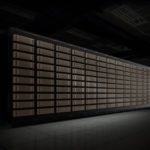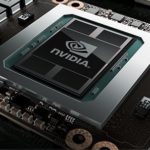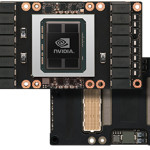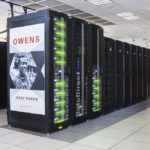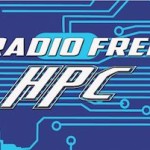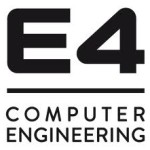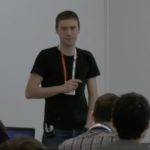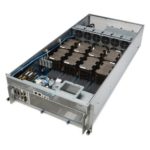“The basic idea of deep learning is to automatically learn to represent data in multiple layers of increasing abstraction, thus helping to discover intricate structure in large datasets. NVIDIA has invested in SaturnV, a large GPU-accelerated cluster, (#28 on the November 2016 Top500 list) to support internal machine learning projects. After an introduction to deep learning on GPUs, we will address a selection of open questions programmers and users may face when using deep learning for their work on these clusters.”
Tesla P100 GPUs Speed Cloud-Based Deep Learning on the Nimbix Cloud
“Nimbix has tremendous experience in GPU cloud computing, going all the way back to NVIDIA’s Fermi architecture,” said Steve Hebert, CEO of Nimbix. “We are looking forward to accelerating deep learning and analytics applications for customers seeking the latest generation GPU technology available in a public cloud.”
NVIDIA Tesla P100 GPU Speeds AI Workloads in the IBM Cloud
Today IBM announced that it is the first major cloud provider to make the Nvidia Tesla P100 GPU accelerator available globally on the cloud. “As the AI era takes hold, demand continues to surge for our GPU-accelerated computing platform in the cloud,” said Ian Buck, general manager, Accelerated Computing, NVIDIA. “These new IBM Cloud offerings will provide users with near-instant access to the most powerful GPU technologies to date – enabling them to create applications to address complex problems that were once unsolvable.”
Dell Powers New Owens Cluster at Ohio State
Today the Ohio Supercomputer Center dedicated its newest, most powerful supercomputer: the Owens Cluster. The Dell cluster, named for the iconic Olympic champion Jesse Owens, delivers 1.5 petaflops of total peak performance. “OSC’s Owens Cluster represents one of the most significant HPC systems Dell has built,” said Tony Parkinson, Vice President for NA Enterprise Solutions and Alliances at Dell.
Radio Free HPC Looks at Azure’s Move to GPUs and OCP for Deep Learning
In this podcast, the Radio Free HPC team looks at a set of IT and Science stories. Microsoft Azure is making a big move to GPUs and the OCP Platform as part of their Project Olympus. Meanwhile, Huawei is gaining market share in the server market and IBM is bringing storage to the atomic level.
E4 Computer Engineering’s Showcases New Petascale OCP Platform
Today E4 Computer Engineering from Italy showcased a new PetaFlops-Class Open Compute Server with “remarkable energy efficiency” based on the IBM POWER architecture. “Finding new ways of making easily deployable and energy efficient HPC solutions is often a complex task, which requires a lot of planning, testing and benchmarking – said Cosimo Gianfreda CTO, Co-Founder, E4 Computer Engineering. – We are very lucky to work with great partners like Wistron, as their timing and accuracy means we have all the right conditions to have effective time-to-market. I strongly believe that the performance on the node, coupled with the power monitoring technology, will receive a wide acceptance from the HPC and Enterprise community.”
Introduction to GPUs in HPC
“This video is from the opening session of the “Introduction to Programming Pascal (P100) with CUDA 8″ workshop at CSCS in Lugano, Switzerland. The three-day course is intended to offer an introduction to Pascal computing using CUDA 8.”
Nvidia Brings AI to the Cloud with the HGX-1 Hyperscale GPU Accelerator
Today, Microsoft, NVIDIA, and Ingrasys announced a new industry standard design to accelerate Artificial Intelligence in the next generation cloud. “Powered by eight NVIDIA Tesla P100 GPUs in each chassis, HGX-1 features an innovative switching design based on NVIDIA NVLink interconnect technology and the PCIe standard, enabling a CPU to dynamically connect to any number of GPUs. This allows cloud service providers that standardize on the HGX-1 infrastructure to offer customers a range of CPU and GPU machine instance configurations.”
NVIDIA Pascal GPUs come to Advanced Clustering Technologies
Missouri-based Advanced Clustering Technologies is helping customers solve challenges by integrating NVIDIA Tesla P100 accelerators into its line of high performance computing clusters. Advanced Clustering Technologies builds custom, turn-key HPC clusters that are used for a wide range of workloads including analytics, deep learning, life sciences, engineering simulation and modeling, climate and weather study, energy exploration, and improving manufacturing processes. “NVIDIA-enabled GPU clusters are proving very effective for our customers in academia, research and industry,” said Jim Paugh, Director of Sales at Advanced Clustering. “The Tesla P100 is a giant step forward in accelerating scientific research, which leads to breakthroughs in a wide variety of disciplines.”
Radio Free HPC Reviews the SC16 Student Cluster Competition Configurations & Results
In this podcast, the Radio Free HPC team reviews the results from SC16 Student Cluster Competition. “This year, the advent of clusters with the new Nvidia Tesla P100 GPUs made a huge impact, nearly tripling the Linpack record for the competition. For the first-time ever, the team that won top honors also won the award for achieving highest performance for the Linpack benchmark application. The team “SwanGeese” is from the University of Science and Technology of China. In traditional Chinese culture, the rare Swan Goose stands for teamwork, perseverance and bravery.”

